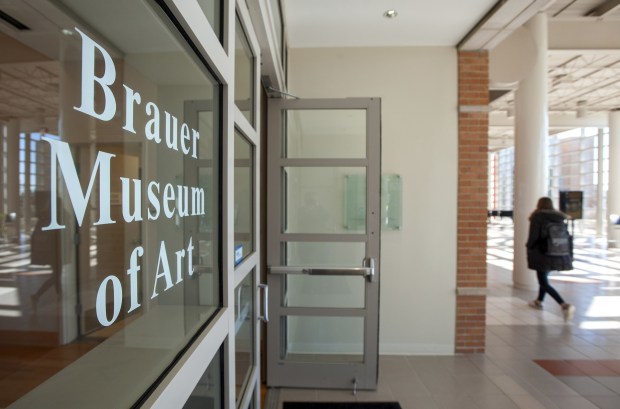The proposed cuts at Valparaiso University announced on March 1 have department heads and professors preparing to defend their programs as they fear the loss of a liberal arts education and the connections to the very tenets upon which the Lutheran university is based.
Colleges and universities across the country have been slashing foreign language and other liberal arts offerings as they focus on STEM programs but for Valparaiso University, the proposal comes just a few years after it cut its theater major and some foreign languages, and a little more than a year after backlash from the campus, alumni and arts community nationwide began over consideration to sell millions of dollars in renowned artwork to fund dorm renovations.
The announcement came as students and faculty prepared to go on a two-week spring break.
“I want to hold onto Valparaiso University’s Lutheran heritage,” said Matthew Becker, a theology professor, who added philosophy, which merged with theology a few years ago, is also being considered for cuts.
He fears the cuts, if made as proposed, will sever the university’s connection with that heritage and end the university’s position as a leader in music and theology.
“This does go to the heart of Valpo’s stated mission when you’re talking about Lutheran theology,” he said. “It’s just one more nail in the coffin to theology-based liberal arts education, in my opinion.”
Undergraduate programs being considered include German and Spanish majors; bachelor of music; astronomy major and minor; theology major and minor; and the economics and computer analysis major.
Graduate programs include cybersecurity; digital media; sports media; English studies and communication; nurse educator; and public health.
Entrance of the Brauer Museum of Art on the Valparaiso University campus in Valparaiso, Indiana Friday, February 10, 2023. Campus and community members continue to react to the announcement of the pending sale of a painting by Georgia O’Keeffe and two other works to fund first-year student dorm renovations. (Andy Lavalley for the Post-Tribune)
In all, 28 programs are under consideration for cuts, according to a campus memo issued by Eric Johnson, the university’s provost and executive vice president for academic affairs.
Possible outcomes for the departments after further evaluation include programs continuing with changes; development of a cooperative program, through a merger with other departments; or a discontinuation, Johnson said.
Any programs that are discontinued would be phased out through the end of the 2026-27 school year, allowing currently enrolled students to complete their majors, with a decision by the start of the August fall semester.
University’s priorities ‘completely skewed’
Faculty in the programs under consideration for cuts with tenure, like Becker, effectively lose that status, he said, moving instead to rolling contracts that are renewed year by year. Longtime faculty “have no guarantee” they will be retained and could be left scrambling for a new job, and the university needs someone to teach required theology coursework.
“I think the priorities of Valparaiso University are completely skewed right now,” Becker said.
He also noted the university’s purchase about a year ago of The Market, the former Strongbow Inn property, for $2.2 million, not long after officials announced possibly selling the artwork from the Brauer Museum.
The sale, between Luke Land LLC, part of Luke Oil, and the Lutheran University Association Inc., closed on March 9, 2023, according to a deed on file with the Porter County Recorder’s Office. A sales disclosure form provided by the Porter County Assessor’s Office shows the sale price was $2.2 million for the property at 2405 U.S. 30.
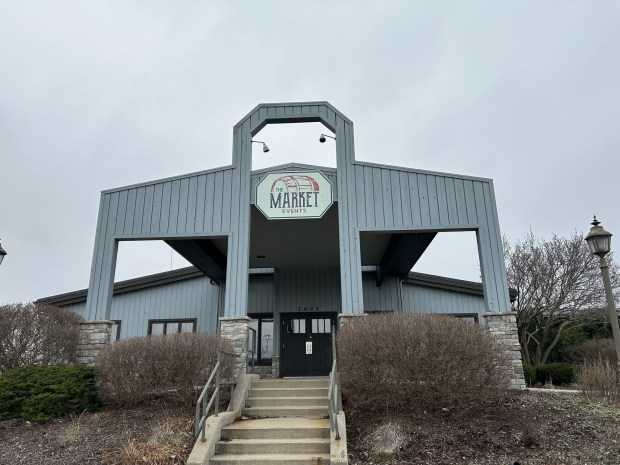
The university’s endowment purchased the land, according to the university’s spokesperson.
University officials, Becker said, would tell him that he’s hanging on to a past that’s no longer viable. He added that the university doesn’t have the number of theology students it had 20 years ago. Around 20 majors graduated then; this year, about seven students are majoring in theology.
“In my view, we’re selling our soul,” he said.
Junior Kayla Sleeper from Westmont, arrived at Valparaiso University as a music education major and changed to theology, but the university’s Lutheran mission is why she chose the school.
“I solely came to Valpo because of the faith community and the faith connection,” she said. “That was the deciding factor for me.”
Sleeper is majoring in theology with minors in music and criminology. She put together a petition to preserve the theology department that she hopes to share with the administration.
While she will be able to complete her program to graduate, cutting the theology department jeopardizes the university’s faith-based reputation.
“I think it’s so much greater than making proposed cuts to theology or German or music,” she said. “To get rid of a theology program at a school that so heavily markets God is hypocritical.”
By Friday afternoon, more than 300 people, including current students and alumni, had signed Sleeper’s petition. Echoing Becker’s concerns, the petition states that eliminating the proposed departments, and theology in particular, would be detrimental to the university’s future.
“Without a Theology program, on what basis, in what ground, would our ‘Lutheran Roots’ be able to sustain and nourish us?” the petition states, going on to note that eliminating theology “weeds out potential students who would make real change on this campus — people who seek to bring hope and justice in a broken and hurting world. Eliminating the Theology degree is detrimental to Christian formation, campus culture, potential for restoration of faith, and much more.”
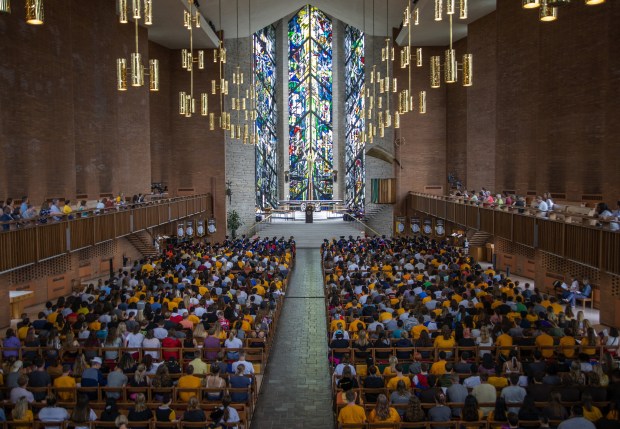
Students and faculty attend the 91st annual opening convocation for new students at Valparaiso University on Tuesday, August 20, 2019. (Michael Gard/Post-Tribune)
The decisions administrators are making, Sleeper said, have no grounding in improving the student experience. Focusing on STEM majors, which bring in money, is straying away from the “liberal arts cause they are so loudly championing.”
Other universities face same challenges
Valparaiso University is not unique in the challenges it’s facing, from cutting traditional liberal arts programs to seemingly untethering from its faith-based heritage.
In an October 2023 opinion piece in Inside Higher Ed, Christopher A. Snyder, a professor of history at Mississippi State University and a visiting research fellow at Oriel College at the University of Oxford, provides a comprehensive list of universities gutting their liberal arts programming or closing completely.
The list includes Wheeling Jesuit University in West Virginia, which changed its name to Wheeling University after the Maryland Province for the Society of Jesus announced in April 2019 that it was ending its affiliation with the university because it was no longer offering a Jesuit education.
“A liberal arts education is not just a collection of different courses and majors from which an undergraduate may choose, often with little guidance or informed discrimination. It is a curriculum that is comprehensive and coherent, teaching tradition while being critical of it,” Snyder wrote, adding, “it is, to borrow from Augustine, learning to love the right things.”
A liberal arts education, Snyder wrote, is at risk of only being available to “the wealthiest, attending the wealthiest colleges, having access to liberal education while our own senatorial class — most graduates of elite institutions — tell the rest of us to choose a more practical major.”
Some of the other universities that have slashed liberal arts programming in recent years include West Virginia University; Marymount University in Virginia; New Jersey City University; and Utica University in New York.
Additionally, “undergraduate enrollments in the humanities in general have shown a dramatic decline in recent years,” Snyder wrote, as, for decades, “political leaders, cultural figures and pragmatic-minded parents have been encouraging students to pursue STEM majors — especially medicine and applied sciences — rather than the arts, humanities and social sciences.”
Still, a handful of universities, including Arizona State University and the University of Washington, are increasing enrollment or building programs in the humanities.
“It is time for faculty throughout the nation in these arts and sciences fields — and our allies — to show the courage of those students and faculty at WVU and Marymount who have protested, launched petitions and led letter-writing campaigns in an attempt — against hope — to stop the destruction of the heart of the university,” Snyder wrote.
Department chairs work to save programs
Department chairs also are trying to navigate the possible cuts, and how they will approach the university in an attempt to stop or stem them.
Stacy Hoult, chair of world languages and cultures, said her department has seen an outpouring of support from current and former students, and their voices will be centered when the department responds to the proposals to discontinue majors in Spanish, German and global studies.
“We’re doing everything we can to maintain these options,” she said, adding she is creating an online forum where students and alumni can register their support for their major, and how their major impacted them personally and professionally.
A few years ago, Holt’s department saw programs in Greek and Roman studies, and Asian languages discontinued, as well as minors in Japanese and Chinese. The department also used to offer majors in French, Greek, Hebrew and Latin.
The university also cut its theater department a few years ago.
It’s not the first time Hoult has gone through the whittling away of her department, and she did attempt to appeal previous cuts.
“When a major or a program is entered into discontinuation, we have 60 days to respond,” she said, adding the discontinuation and response process goes through multiple reviews. “Nothing is official until it gets through the levels of faculty governance.”
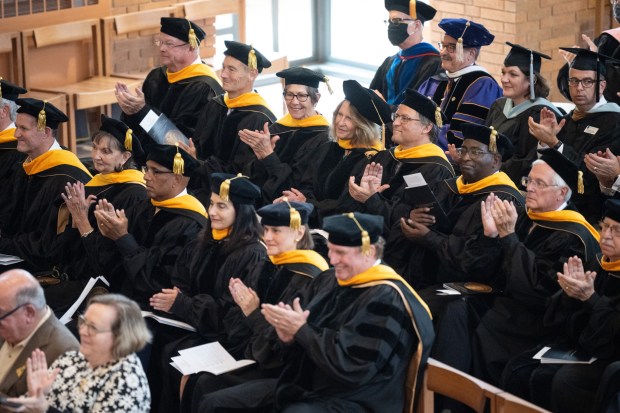
Valparaiso University officials applaud during the inauguration ceremony for new university President Jose Padilla on Saturday, October 30, 2021. (Kyle Telechan for the Post-Tribune)
As far as the music department, two of its degree programs are under review for possible cuts, according to Joseph Bognar, chair of that department.
The music department has 46 music majors, while over 200 Valpo students are engaged in music ensembles, lessons, or classes in some way, Bognar said in an email. Music is one option for students to use to fulfill the fine arts requirement in general education.
“The most important information to get out there is that the Department of Music is not slated for discontinuance,” Bognar said. He was department chair from 2009 to 2018 and resumed the post in the fall.
“We will be reviewing only two of our degree programs, the Bachelor of Music degree and the Bachelor of Music Therapy degree,” he said, adding the Bachelor of Music concentrations are highly specialized degrees that only very few music majors select.
“We will still move forward robustly with the BA in Music (the liberal arts degree) and the Bachelor of Music Education as well as our musical ensembles, all unaffected by the announcement,” Bognar said in the email.
“While the Music Therapy degree will fall under review, we plan to make a strong case for its continuance, citing its core mission and data that point to its promising future; it’s the newest of our degrees (started in 2019) and we feel it has the potential to grow. Along with Music Education, Music Therapy is a perfect fit for an institution whose mission is to prepare students for lives of service and leadership,” he said.
University struggles with enrollment
Enrollment at Valparaiso University has been on the decline overall since the fall of 2015 when, including the now-closed law school, the university hosted a peak of 4,544 students, according to enrollment figures on the university’s website.
Even removing the law school’s 445 students enrolled that year, the student body has continued to shrink. In all, 3,808 students enrolled in the fall of 2018, the first year there were no new law students. By the fall of 2019, the last academic year before the pandemic, the university lost almost 300 students.
By the fall of 2021, the number of students was down to 2,939, and held close to steady for the fall of 2022, with enrollment at 2,964. A year later, as classes got underway for the current academic year, the student population dipped slightly to 2,868.
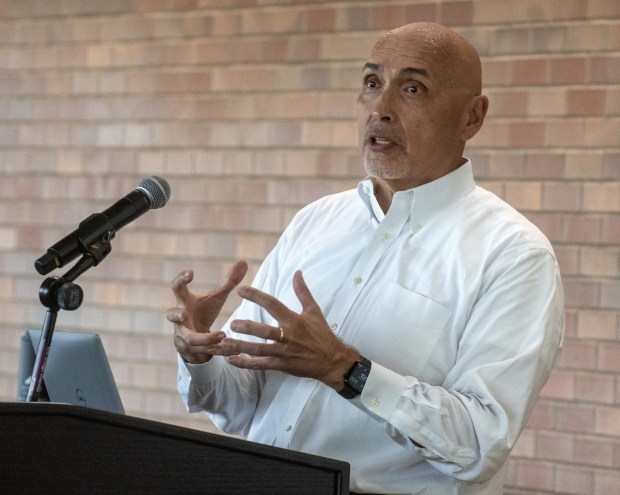
Valparaiso University President Jose Padilla speaks during a community town hall held in Valparaiso, Indiana on Sept. 20, 2022. (Andy Lavalley/for Post-Tribune)
University President José Padilla has said the university, along with other colleges across the country, was facing an enrollment cliff as the number of college-age students declined and universities had to find new ways — and programs — to attract and retain students.
In the fall of 2022, Padilla announced a new strategic plan for the university and said then that the whole dynamic of higher education had changed, with the COVID-19 pandemic bringing those changes to the surface. The percentage of Indiana students attending college dropped from 65% in 2015 to 53% seven years later.
Additionally, a “demographic cliff” has been predicted to hit by 2026, with a significant drop in the percentage of young adults ages 18 to 24 attending college, particularly in the Midwest and the Northeast, he said then.
As Valparaiso University considers cutting programs, it is adding others. The university announced on March 6 that it will launched a master’s in social work program, noting in a release that “With the demand for social work professionals set to grow by 9% between 2021 and 2031, this program prepares students to enter a rapidly expanding field with immense potential for professional opportunities.”
University officials also emphasized the new program when they announced the proposed department cuts, and Johnson, the university provost, noted that the campus “is constantly evaluating, anticipating, and responding to a changing student population, market, and world to keep the best interests of our students at the center of all that we do.”


